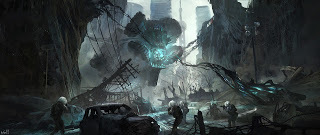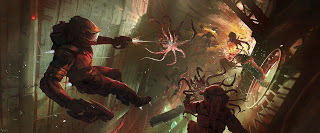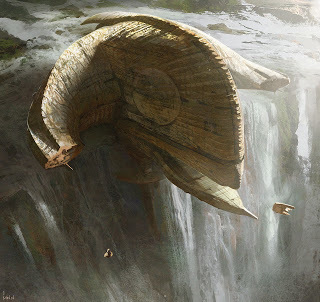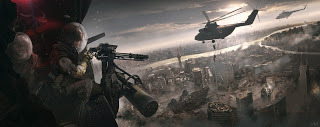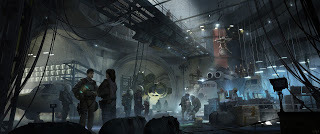Chris Morton's Blog, page 11
January 18, 2020
January's Interview - Jade Jesser
January's Interview - Jade Jesser

Q. Firstly tell us about your Baelfire book series.
It's a brainchild decades in the making. I started telling stories for as long as I can remember, and originally wrote the story from a different main character's perspective back in 1995. It was terrible.
It was so bad that I actually got discouraged from writing, but continued character and environmental development through drawings.After a couple of decades, I revisited the work I had, and rewrote the book as it is.
Honestly, I didn't write it thinking about any sort of retail gain, rather, I wrote it because there are so few books in the genre that I felt had a dark reality to them. I liken the work to a Tarantino film crossed with elements of Tolkien: as if reality and fantasy had a love child.
Q. Your first book, ‘Baelfire: Innocence Lost’ has received a lot of positive reviews. Why do you think it appeals to so many people?
Well this is my first book, so I would have to say that my strengths are character development, and dialogue. I think many of my readers find that the content is relatable, rather than being lost in some sort of heavy explanation of objects or details.I also have been told on many occasions that I have strength in writing female characters, whereas many authors seem to fall victim to clichés and stereotypes. I plan on continuing this standard in future works.
Q. Where did the idea for the Baelfire series come from?
Baelfire, as a whole, is a convoluted metaphor. The "idea" took on a life of its own when I attempted to make sense of the world we live in. Throw in a cuddle puddle of academic study and role playing games, and you have a bit of an idea of where my head was at when I started letting the words appear on screen.
Q. You describe your childhood as having rancher parents, often finding yourself in the dust and mud of small town America. I imagine stories told round a campfire?
My sisters always scared the shit out of me around the campfire, if that's what you mean! For the most part, I had a pretty lonely childhood, worked hard (even as a kid,) and spent a lot of time alone allowing my imagination to take over.
Q. You studied acting and some reviews say your writing is very visual, almost movie-like. Is there a link here?
Probably. I mentioned Tarantino above, and I do have to say that his style of writing has been a heavy influence on me. Going back even further, I'd have to throw a shout out to Shakespeare. Both of these guys have a way of writing for the common man (of the time period,) and I hope I have captured even a fraction of their greatness.
Q. How about the degree in Anthropology. Another influence?
Oh yes. Unlike other degree-seekers, I studied Anthropology to enhance my understanding of the human condition out of pure love for the human condition. Diversity, in my humble opinion, is the key to a successful future for all humanity; one can only hope to understand a portion of this by devoting countless hours studying other cultures. I hope that my writing shows all of these hours of attempted understanding...maybe even to influence someone to do the same.
Q.You came up with the quote: ‘Science is both a liberator and destroyer.’ Can you expand on this?
I could, but it would be a spoiler...
Q. Often artists see and experience the world in a different way to most. How about you?
That's a million-dollar question! I think as an artist, it really is important to recognise that everyone sees the world differently. That's truly the beauty of art. When one makes art with words, you have the amazing ability to allow another to connect the dots and create their own paintings.I know that I see the world differently than most, and I do want to be able to share that vision, while walking the peripheral safety net-free tightrope of reader interpretation. For example: I love asking people how they see the huge beasts the Plainsmen call "Toenuk." I've heard a hundred different interpretations, and not many match my own vision. It always makes me smile.
Q. There was quite a gap between the release of book one and book 2. How long does it take you to write a novel? Take us through your writing process.
Life stuff is funny. I really do hope to one day become noticed enough to write Baelfire (and other titles I'm working) full time. As it sits however, my responsibilities are pretty overwhelming. I do a lot of work ghost writing for fitness and nutrition, so admittedly, I spend a lot of my creative fuel paying the bills.
If I did the math, it takes me an average of 15 years to write a book...even though my outline is mapped out for 9. I realize I'm an author, not a mathematician, but I am definitely going to have to figure out a way to speed that up!
Q. Are you working on the next book in the series now?
A: I am, and it is nearly complete.
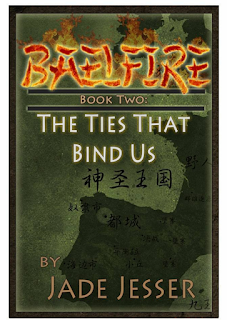
Okay, thanks for the interview.You can purchase the Balfire books from amazon via the link here.Connect with Jade via Facebook here.and follow him on instagram here.
Published on January 18, 2020 22:33
January 7, 2020
January's Book - Moon-Sitting by Emma Mort Harding
January's Book - Moon-Sitting by Emma Mort Harding
A beautifully written story that is as much literary fiction as it is sci-fi. Compelling reading from an author on the rise.
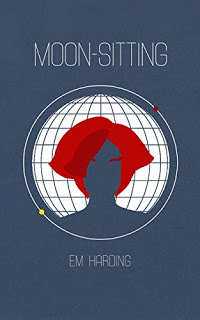
The Moon fell into the Ocean and the Waves wept.
Infinity was once home to a thriving civilisation. That is, before the Moon arrived. The enormous, spherical structure brought with it death and destruction, wiping out most of the population with a series of earthquakes and tsunamis.
Since then the Moon has sat silently on the southern edge of Infinity’s mass continent.
Lucky Marsh is one of three moon-sitters charged with monitoring the Moon, acting as a living alarm system for Infinity’s last city. They must watch, but never touch: that’s the golden rule of moon-sitting. However, for the ever-curious Lucky, that rule has become increasingly difficult to abide.
Her nightmares compel her to do more. Her feet betray her while she sleeps
Published on January 07, 2020 19:58
January 3, 2020
January's Story - 2 B R 0 2 B by Kurt Vonnegut
January's Story - 2 B R 0 2 B by Kurt Vonnegut
Everything was perfectly swell. There were no prisons, no slums, no insane asylums, no cripples, no poverty, no wars. All diseases were conquered. So was old age. Death, barring accidents, was an adventure for volunteers.The population of the United States was stabilized at forty-million souls.One bright morning in the Chicago Lying-in Hospital, a man named Edward K. Wehling, Jr., waited for his wife to give birth. He was the only man waiting. Not many people were born a day any more.Wehling was fifty-six, a mere stripling in a population whose average age was one hundred and twenty-nine. X-rays had revealed that his wife was going to have triplets. The children would be his first.Young Wehling was hunched in his chair, his head in his hand. He was so rumpled, so still and colorless as to be virtually invisible. His camouflage was perfect, since the waiting room had a disorderly and demoralized air, too. Chairs and ashtrays had been moved away from the walls. The floor was paved with spattered dropcloths.The room was being redecorated. It was being redecorated as a memorial to a man who had volunteered to die.A sardonic old man, about two hundred years old, sat on a stepladder, painting a mural he did not like. Back in the days when people aged visibly, his age would have been guessed at thirty-five or so. Aging had touched him that much before the cure for aging was found.The mural he was working on depicted a very neat garden. Men and women in white, doctors and nurses, turned the soil, planted seedlings, sprayed bugs, spread fertilizer. Men and women in purple uniforms pulled up weeds, cut down plants that were old and sickly, raked leaves, carried refuse to trash-burners. Never, never, never – not even in medieval Holland nor old Japan – had a garden been more formal, been better tended. Every plant had all the loam, light, water, air and nourishment it could use.A hospital orderly came down the corridor, singing under his breath a popular song:
If you don’t like my kisses, honey,Here’s what I will do:I’ll go see a girl in purple,Kiss this sad world toodle-oo.If you don’t want my lovin’,Why should I take up all this space?I’ll get off this old planet,Let some sweet baby have my place.
The orderly looked in at the mural and the muralist. “Looks so real,” he said, “I can practically imagine I’m standing in the middle of it.”“What makes you think you’re not in it?” said the painter. He gave a satiric smile. “It’s called ‘The Happy Garden of Life,’ you know.”“That’s good of Dr. Hitz,” said the orderly.He was referring to one of the male figures in white, whose head was a portrait of Dr. Benjamin Hitz, the hospital’s Chief Obstetrician. Hitz was a blindingly handsome man.“Lot of faces still to fill in,” said the orderly. He meant that the faces of many of the figures in the mural were still blank. All blanks were to be filled with portraits of important people on either the hospital staff or from the Chicago Office of the Federal Bureau of Termination. “Must be nice to be able to make pictures that look like something.”The painter’s face curdled with scorn. “You think I’m proud of this daub?” he said. “You think this is my idea of what life really looks like?”“What’s your idea of what life looks like?” said the orderly.The painter gestured at a foul dropcloth. “There’s a good picture of it,” he said. “Frame that, and you’ll have a picture a damn sight more honest than this one.”“You’re a gloomy old duck, aren’t you?” said the orderly.“Is that a crime?” said the painter.The orderly shrugged. “If you don’t like it here, Grandpa –” he said, and he finished the thought with the trick telephone number that people who didn’t want to live any more were supposed to call. The zero in the telephone number he pronounced “naught.”The number was: “2 B R 0 2 B.”It was the telephone number of an institution whose fanciful sobriquets included: “Automat,” “Birdland,” “Cannery,” “Catbox,” “De-louser,” “Easy-go,” “Good-by, Mother,” “Happy Hooligan,” “Kiss-me-quick,” “Lucky Pierre,” “Sheepdip,” “Waring Blendor,” “Weep-no-more” and “Why Worry?”“To be or not to be” was the telephone number of the municipal gas chambers of the Federal Bureau of Termination.The painter thumbed his nose at the orderly. “When I decide it’s time to go,” he said, “it won’t be at the Sheepdip.”“A do-it-yourselfer, eh?” said the orderly. “Messy business, Grandpa. Why don’t you have a little consideration for the people who have to clean up after you?”The painter expressed with an obscenity his lack of concern for the tribulations of his survivors. “The world could do with a good deal more mess, if you ask me,” he said.The orderly laughed and moved on. Wehling, the waiting father, mumbled something without raising his head. And then he fell silent again.A coarse, formidable woman strode into the waiting room on spike heels. Her shoes, stockings, trench coat, bag and overseas cap were all purple, the purple the painter called “the color of grapes on Judgment Day.”The medallion on her purple musette bag was the seal of the Service Division of the Federal Bureau of Termination, an eagle perched on a turnstile.The woman had a lot of facial hair – an unmistakable mustache, in fact. A curious thing about gas-chamber hostesses was that, no matter how lovely and feminine they were when recruited, they all sprouted mustaches within five years or so.“Is this where I’m supposed to come?” she said to the painter.“A lot would depend on what your business was,” he said. “You aren’t about to have a baby, are you?”“They told me I was supposed to pose for some picture,” she said. “My name’s Leora Duncan.” She waited.“And you dunk people,” he said.“What?” she said.“Skip it,” he said.“That sure is a beautiful picture,” she said. “Looks just like heaven or something.”“Or something,” said the painter. He took a list of names from his smock pocket. “Duncan, Duncan, Duncan,” he said, scanning the list. “Yes—here you are. You’re entitled to be immortalized. See any faceless body here you’d like me to stick your head on? We’ve got a few choice ones left.”She studied the mural bleakly. “Gee,” she said, “they’re all the same to me. I don’t know anything about art.”“A body’s a body, eh?” he said. “All righty. As a master of fine art, I recommend this body here.” He indicated a faceless figure of a woman who was carrying dried stalks to a trash-burner.“Well,” said Leora Duncan, “that’s more the disposal people, isn’t it? I mean, I’m in service. I don’t do any disposing.”The painter clapped his hands in mock delight. “You say you don’t know anything about art, and then you prove in the next breath that you know more about it than I do! Of course the sheave-carrier is wrong for a hostess! A snipper, a pruner – that’s more your line.” He pointed to a figure in purple who was sawing a dead branch from an apple tree. “How about her?” he said. “You like her at all?”“Gosh –” she said, and she blushed and became humble – “that–that puts me right next to Dr. Hitz.”“That upsets you?” he said.“Good gravy, no!” she said. “It’s–it’s just such an honor.”“Ah, You... you admire him, eh?” he said.“Who doesn’t admire him?” she said, worshiping the portrait of Hitz. It was the portrait of a tanned, white-haired, omnipotent Zeus, two hundred and forty years old. “Who doesn’t admire him?” she said again. “He was responsible for setting up the very first gas chamber in Chicago.”“Nothing would please me more,” said the painter, “than to put you next to him for all time. Sawing off a limb – that strikes you as appropriate?”“That is kind of like what I do,” she said. She was demure about what she did. What she did was make people comfortable while she killed them.And, while Leora Duncan was posing for her portrait, into the waiting room bounded Dr. Hitz himself. He was seven feet tall, and he boomed with importance, accomplishments, and the joy of living.“Well, Miss Duncan! Miss Duncan!” he said, and he made a joke. “What are you doing here?” he said. “This isn’t where the people leave. This is where they come in!”“We’re going to be in the same picture together,” she said shyly.“Good!” said Dr. Hitz heartily. “And, say, isn’t that some picture?”“I sure am honored to be in it with you,” she said.“Let me tell you,” he said, “I’m honored to be in it with you. Without women like you, this wonderful world we’ve got wouldn’t be possible.”He saluted her and moved toward the door that led to the delivery rooms. “Guess what was just born,” he said.“I can’t,” she said.“Triplets!” he said.“Triplets!” she said. She was exclaiming over the legal implications of triplets. The law said that no newborn child could survive unless the parents of the child could find someone who would volunteer to die.Triplets, if they were all to live, called for three volunteers.“Do the parents have three volunteers?” said Leora Duncan.“Last I heard,” said Dr. Hitz, “they had one, and were trying to scrape another two up.”“I don’t think they made it,” she said. “Nobody made three appointments with us. Nothing but singles going through today, unless somebody called in after I left. What’s the name?”“Wehling,” said the waiting father, sitting up, red-eyed and frowzy. “Edward K. Wehling, Jr., is the name of the happy father-to-be.” He raised his right hand, looked at a spot on the wall, gave a hoarsely wretched chuckle. “Present,” he said.“Oh, Mr. Wehling,” said Dr. Hitz, “I didn’t see you.”“The invisible man,” said Wehling.“They just phoned me that your triplets have been born,” said Dr. Hitz. “They’re all fine, and so is the mother. I’m on my way in to see them now.”“Hooray,” said Wehling emptily.“You don’t sound very happy,” said Dr. Hitz.“What man in my shoes wouldn’t be happy?” said Wehling. He gestured with his hands to symbolize care-free simplicity. “All I have to do is pick out which one of the triplets is going to live, then deliver my maternal grandfather to the Happy Hooligan, and come back here with a receipt.”Dr. Hitz became rather severe with Wehling, towered over him. “You don’t believe in population control, Mr. Wehling?” he said.“I think it’s perfectly keen,” said Wehling tautly.“Would you like to go back to the good old days, when the population of the Earth was twenty billion – about to become forty billion, then eighty billion, then one hundred and sixty billion? Do you know what a drupelet is, Mr. Wehling?” said Hitz.“Nope,” said Wehling sulkily.“A drupelet, Mr. Wehling, is one of the little knobs, one of the little pulpy grains of a blackberry,” said Dr. Hitz. “Without population control, human beings would now be packed on this surface of this old planet like drupelets on a blackberry! Think of it!”Wehling continued to stare at the same spot on the wall.“In the year 2000,” said Dr. Hitz, “before scientists stepped in and laid down the law, there wasn’t even enough drinking water to go around, and nothing to eat but sea-weed – and still people insisted on their right to reproduce like jackrabbits. And their right, if possible, to live forever.”“I want those kids,” said Wehling quietly. “I want all three of them.”“Of course you do,” said Dr. Hitz. “That’s only human.”“I don’t want my grandfather to die, either,” said Wehling.“Nobody’s really happy about taking a close relative to the Catbox,” said Dr. Hitz gently, sympathetically.“I wish people wouldn’t call it that,” said Leora Duncan.“What?” said Dr. Hitz.“I wish people wouldn’t call it ‘the Catbox,’ and things like that,” she said. “It gives people the wrong impression.”“You’re absolutely right,” said Dr. Hitz. “Forgive me.” He corrected himself, gave the municipal gas chambers their official title, a title no one ever used in conversation. “I should have said, ‘Ethical Suicide Studios,’” he said.“That sounds so much better,” said Leora Duncan.“This child of yours – whichever one you decide to keep, Mr. Wehling,” said Dr. Hitz. “He or she is going to live on a happy, roomy, clean, rich planet, thanks to population control. In a garden like that mural there.” He shook his head. “Two centuries ago, when I was a young man, it was a hell that nobody thought could last another twenty years. Now centuries of peace and plenty stretch before us as far as the imagination cares to travel.”He smiled luminously.The smile faded as he saw that Wehling had just drawn a revolver.Wehling shot Dr. Hitz dead. “There’s room for one – a great big one,” he said.And then he shot Leora Duncan. “It’s only death,” he said to her as she fell. “There! Room for two.”And then he shot himself, making room for all three of his children.Nobody came running. Nobody, seemingly, heard the shots.The painter sat on the top of his stepladder, looking down reflectively on the sorry scene.The painter pondered the mournful puzzle of life demanding to be born and, once born, demanding to be fruitful … to multiply and to live as long as possible – to do all that on a very small planet that would have to last forever.All the answers that the painter could think of were grim. Even grimmer, surely, than a Catbox, a Happy Hooligan, an Easy Go. He thought of war. He thought of plague. He thought of starvation.He knew that he would never paint again. He let his paintbrush fall to the dropcloths below. And then he decided he had had about enough of life in the Happy Garden of Life, too, and he came slowly down from the ladder.He took Wehling’s pistol, really intending to shoot himself.But he didn’t have the nerve.And then he saw the telephone booth in the corner of the room. He went to it, dialed the well-remembered number: “2 B R 0 2 B.”“Federal Bureau of Termination,” said the very warm voice of a hostess.“How soon could I get an appointment?” he asked, speaking very carefully.“We could probably fit you in late this afternoon, sir,” she said. “It might even be earlier, if we get a cancellation.”“All right,” said the painter, “fit me in, if you please.” And he gave her his name, spelling it out.“Thank you, sir,” said the hostess. “Your city thanks you; your country thanks you; your planet thanks you. But the deepest thanks of all is from future generations.”
Kurt Vonnegut needs no introduction.You can find his wikipedia page here.This story was first published in Worlds of If Science Fiction, January 1962.
This story is taken from Project Gutenberg. For legal reasons the following statement must be included: (This eBook is for the use of anyone anywhere at no cost and with almost no restrictions whatsoever. You may copy it, give it away or re-use it under the terms of the Project Gutenberg License included with this eBook or online at www.gutenberg.org).
Published on January 03, 2020 17:27
December 28, 2019
December's Art - Min Guen
Published on December 28, 2019 00:35
December 19, 2019
December's Interview - J. F. Holmes
December's Interview - J. F. Holmes

Q. So tell us about JTF13.
Joint Task Force 13 is a shared universe based on historical operations by US Military units fighting supernatural forces on the battlefield.
Q. The first JTF13 book (Origins: A Joint Task Force 13 Anthology) has already been released and is doing well. Gives us a quick summary of the stories in this anthology.
“Devils and Dust” by two time Dragon finalist J.F. Holmes takes place in the Syrian Civil War, 2018. A JTF squad sent to take out a terrorist dabbling in the supernatural finds that they're up against an ancient god determined to walk the earth again.
“Redeye” by Dan Humphreys follows a pair of military contractors as they fly home from a job in the Middle East. Unknown to the two ex-Rangers, onboard is necromancer intent on getting a foothold in the United States.
“Revolution” by Lucas Marcum. Outside Valley Forge in the brutal winter of 1777, American Marines and British Redcoats team up to defeat an Old World threat that has beenleaving soldiers of both sides drained of blood and lifeless in the snow.
“Run through the Jungle” by Lloyd Behm II. A French plantation owner turns to the supernatural to punish all sides in the Vietnam War, dragging the men of Task Force 13 into a vicious battle with the undead.
“Spy vs. Spy” by Michael Morton. In the opening moves of the Pacific War, an American detachment takes on a Japanese intelligence officer in the Philippines who using supernatural powers to run a spy network.
“Devil Dogs” by Chris Bast. A young Marine in the mountains of Afghanistan beholds the horrors of hell as his platoon is overrun by demons, and his desire for revenge drives him to accompany a JTF 13 squad as they hunt the demons’ master.
“Troll” by J.F. Holmes. A squad from the 82nd Airborne is wiped out trying to destroy a bridge behind enemy lines on June 6th, 1944, and the Task Force is called in to deal with the ancient enemy hiding beneath it.
Q. How many of the JTF13 books will be novels and how many will be anthologies?
We may do an anthology again in the future, but our plans are for five or six novels next year.
Q. How many of the novels do you have so far? I’m assuming you’re still looking for more authors?
Ten are supposedly in the works, but I expect five to actually happen with the year. Yes, of course, absolutely!
Q. Will the novels be released in chronological order?
No, they skip back and forth through history and are, for the most part, stand alone books. Though there will be an overall plot and tie ins.
Q. Will the invaders/monsters always be coming from the same alien source?
They come from the supernatural world and are native to that regions. For example, Djins in the Middle East and classical Dragons in Europe.
Q. I heard that JTF13 was inspired by true unexplained events in military history. One in particular was giant spiders in Vietnam …?
I can neither confirm nor deny but the story is out there!
Q. Will all of the novels be action/adventure?
Yes
Q. I’ve heard rumours of a JTF13 inspired video game. Is this true?
Wouldn’t that be freaking awesome?
Q. Okay, a bit about your background. You’re the creator of Cannon Books Publishing and have twice been a finalist for the prestigious Dragon Awards.
Well, one day about seven years ago I was watching an episode of The Walking Dead, doing the military thing and commenting on what utter bullsh*t the firearms and tactics were. My wife dared me to do better, and Even Zombie Killers Get The Blues was born. That was seventeen books and hundreds of thousands of words ago.
I started Cannon because I want to help out writers who are just getting started and have potential. That and make money, but I wanted to see more of the kinds of military Sci-Fi and Fantasy books I grew up reading.
Q. In a previous incarnation you were a military officer and trainer. So for this last question, how about a quick pep talk for our readers (many of whom are writers too).
Well, NCO, not Officer. Retired after 22 years.
Real quick:
1. Don’t stop writing.2. Be open to criticism. My grammar on my first book was horrible, to the point where my wife refused to read it. The odds are a million to one that you wrote the perfect book, and writing is a trade that you can only get better at. 3. Don’t quit your day job expecting to be an overnight smash. It might happen, but probably not. Writing is a job like any other, and it takes hard work, but you can do it.
Q. Great stuff. And the next JTF13 book? What’s the title and when will it be out?
Widowmakers, coming out probably in February 2020. Written by William Roberts , an Air Force veteran, his heroes have to deal with a major gremlin threat to the Army Air Force night attack fighters in France, 1944.
Outside of JTF, Lucas Marcum’s follow up to his smash debut novel Valkyrie is out. Valkyrie: Rebellion is going gang busters too.
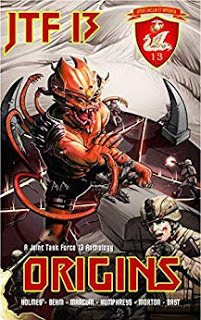
Okay, thanks John.You can check out John’s amazon page here.Connect with him on goodreads here. And take a look at the JTF13 Anthology here .You can also contact John through the Cannon Books website here.
Published on December 19, 2019 06:21
December 11, 2019
December's Book - Creation Machine by Andrew Bannister
December's Book - Creation Machine by Andrew Bannister
Andrew Bannister has been making waves this year with his Spin Trilogy books. Here's the first of them.
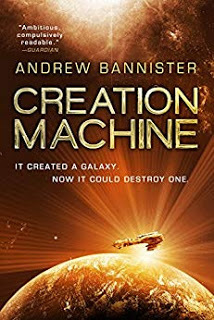
Creation Machine is a fast-paced, whip-smart science fiction debut from Andrew Bannister introducing the stunning galaxy called the Spin.In the vast, artificial galaxy called the Spin, a rebellion has been crushed.Viklun Hass is eliminating all remnants of the opposition. Starting with his daughter.But Fleare Hass has had time to plan her next move from exile to the very frontiers of a new war.For hundreds of millions of years, the planets and stars of the Spin have been the only testament to the god-like engineers that created them. Now, beneath the surface of a ruined planet, one of their machines has been found.
Published on December 11, 2019 20:35
December 3, 2019
December's Story - A Little Journey by Ray Bradbury
December's Story - A Little Journey by Ray Bradbury
There were two important things – one, that she was very old; two, that Mr. Thirkell was taking her to God. For hadn’t he patted her hand and said: “Mrs. Bellowes, we’ll take off into space in my rocket, and go to find Him together.”And that was how it was going to be. Oh, this wasn’t like any other group Mrs. Bellowes had ever joined. In her fervor to light a path for her delicate, tottering feet, she had struck matches down dark alleys, and found her way to Hindu mystics who floated their flickering, starry eyelashes over crystal balls. She had walked on the meadow paths with ascetic Indian philosophers imported by daughters-in-spirit of Madame Blavatsky. She had made pilgrimages to California’s stucco jungles to hunt the astrological seer in his natural habitat. She had even consented to signing away the rights to one of her homes in order to be taken into the shouting order of a temple of amazing evangelists who had promised her golden smoke, crystal fire, and the great soft hand of God coming to bear her home.None of these people had ever shaken Mrs. Bellowes’ faith, even when she saw them sirened away in a black wagon in the night, or discovered their pictures, bleak and unromantic, in the morning tabloids. The world had roughed them up and locked them away because they knew too much, that was all.And then, two weeks ago, she had seen Mr. Thirkell’s advertisement in New York City:
COME TO MARS!
Stay at the Thirkell Restorium for one week. And then, on into space on the greatest adventure life can offer!Send for Free Pamphlet: “Nearer My God To Thee.”Excursion rates. Round trip slightly lower.“Round trip,” Mrs. Bellowes had thought. “But who would come back after seeing Him?”And so she had bought a ticket and flown off to Mars and spent seven mild days at Mr. Thirkell’s Restorium, the building with the sign on it which flashed: THIRKELL’S ROCKET TO HEAVEN! She had spent the week bathing in limpid waters and erasing the care from her tiny bones, and now she was fidgeting, ready to be loaded into Mr. Thirkell’s own special private rocket, like a bullet, to be fired on out into space beyond Jupiter and Saturn and Pluto. And thus – who could deny it? – you would be getting nearer and nearer to the Lord. How wonderful! Couldn’t you just feelHim drawing near? Couldn’t you just sense His breath, His scrutiny, His Presence?“Here I am,” said Mrs. Bellowes, “an ancient rickety elevator, ready to go up the shaft. God need only press the button.”Now, on the seventh day, as she minced up the steps of the Restorium, a number of small doubts assailed her.“For one thing,” she said aloud to no one, “it isn’t quite the land of milk and honey here on Mars that they said it would be. My room is like a cell, the swimming pool is really quite inadequate, and, besides, how many widows who look like mushrooms or skeletons want to swim? And, finally, the whole Restorium smells of boiled cabbage and tennis shoes!”She opened the front door and let it slam, somewhat irritably.She was amazed at the other women in the auditorium. It was like wandering in a carnival mirror-maze, coming again and again upon yourself – the same floury face, the same chicken hands, and jingling bracelets. One after another of the images of herself floated before her. She put out her hand, but it wasn’t a mirror; it was another lady shaking her fingers and saying:“We’re waiting for Mr. Thirkell. Sh!”“Ah,” whispered everyone.The velvet curtains parted.Mr. Thirkell appeared, fantastically serene, his Egyptian eyes upon everyone. But there was something, nevertheless, in his appearance which made one expect him to call “Hi!” while fuzzy dogs jumped over his legs, through his hooped arms, and over his back. Then, dogs and all, he should dance with a dazzling piano-keyboard smile off into the wings.Mrs. Bellowes, with a secret part of her mind which she constantly had to grip tightly, expected to hear a cheap Chinese gong sound when Mr. Thirkell entered. His large liquid dark eyes were so improbable that one of the old ladies had facetiously claimed she saw a mosquito cloud hovering over them as they did around summer rain-barrels. And Mrs. Bellowes sometimes caught the scent of the theatrical mothball and the smell of calliope steam on his sharply pressed suit.But with the same savage rationalization that had greeted all other disappointments in her rickety life, she bit at the suspicion and whispered, “This time it’s real. This time it’ll work. Haven’t we got a rocket?”Mr. Thirkell bowed. He smiled a sudden Comedy Mask smile. The old ladies looked in at his epiglottis and sensed chaos there.Before he even began to speak, Mrs. Bellowes saw him picking up each of his words, oiling it, making sure it ran smooth on its rails. Her heart squeezed in like a tiny fist, and she gritted her porcelain teeth.“Friends,” said Mr. Thirkell, and you could hear the frost snap in the hearts of the entire assemblage.“No!” said Mrs. Bellowes ahead of time. She could hear the bad news rushing at her, and herself tied to the track while the immense black wheels threatened and the whistle screamed, helpless.“There will be a slight delay,” said Mr. Thirkell.In the next instant, Mr. Thirkell might have cried, or been tempted to cry, “Ladies, be seated!” in minstrel-fashion, for the ladies had come up at him from their chairs, protesting and trembling.“Not a very long delay.” Mr. Thirkell put up his hands to pat the air.“How long?”“Only a week.”“A week!”“Yes. You can stay here at the Restorium for seven more days, can’t you? A little delay won’t matter, will it, in the end? You’ve waited a lifetime. Only a few more days.”At twenty dollars a day, thought Mrs. Bellowes, coldly.“What’s the trouble?” a woman cried.“A legal difficulty,” said Mr. Thirkell.“We’ve a rocket, haven’t we?”“Well, ye-ess.”“But I’ve been here a whole month, waiting,” said one old lady. “Delays, delays!”“That’s right,” said everyone.“Ladies, ladies,” murmured Mr. Thirkell, smiling serenely.“We want to see the rocket!” It was Mrs. Bellowes forging ahead, alone, brandishing her fist like a toy hammer.Mr. Thirkell looked into the old ladies’ eyes, a missionary among albino cannibals.“Well, now,” he said.“Yes, now!” cried Mrs. Bellowes.“I’m afraid –” he began.“So am I!” she said. “That’s why we want to see the ship!”“No, no, now, Mrs. –” He snapped his fingers for her name.“Bellowes!” she cried. She was a small container, but now all the seething pressures that had been built up over long years came steaming through the delicate vents of her body. Her cheeks became incandescent. With a wail that was like a melancholy factory whistle, Mrs. Bellowes ran forward and hung to him, almost by her teeth, like a summer-maddened Spitz. She would not and never could let go, until he died, and the other women followed, jumping and yapping like a pound let loose on its trainer, the same one who had petted them and to whom they had squirmed and whined joyfully an hour before, now milling about him, creasing his sleeves and frightening the Egyptian serenity from his gaze.“This way!” cried Mrs. Bellowes, feeling like Madame Lafarge. “Through the back! We’ve waited long enough to see the ship. Every day he’s put us off, every day we’ve waited, now let’s see.”“No, no, ladies!” cried Mr. Thirkell, leaping about.They burst through the back of the stage and out a door, like a flood, bearing the poor man with them into a shed, and then out, quite suddenly, into an abandoned gymnasium.“There it is!” said someone. “The rocket.”And then a silence fell that was terrible to entertain.There was the rocket.Mrs. Bellowes looked at it and her hands sagged away from Mr. Thirkell’s collar.The rocket was something like a battered copper pot. There were a thousand bulges and rents and rusty pipes and dirty vents on and in it. The ports were clouded over with dust, resembling the eyes of a blind hog.Everyone wailed a little sighing wail.“Is that the rocket ship Glory Be to the Highest?” cried Mrs. Bellowes, appalled.Mr. Thirkell nodded and looked at his feet.“For which we paid out our one thousand dollars apiece and came all the way to Mars to get on board with you and go off to find Him?” asked Mrs. Bellowes.“Why, that isn’t worth a sack of dried peas,” said Mrs. Bellowes.“It’s nothing but junk!”Junk, whispered everyone, getting hysterical.“Don’t let him get away!”Mr. Thirkell tried to break and run, but a thousand possum traps closed on him from every side. He withered.Everybody walked around in circles like blind mice. There was a confusion and a weeping that lasted for five minutes as they went over and touched the Rocket, the Dented Kettle, the Rusty Container for God’s Children.“Well,” said Mrs. Bellowes. She stepped up into the askew doorway of the rocket and faced everyone. “It looks as if a terrible thing has been done to us,” she said. “I haven’t any money to go back home to Earth and I’ve too much pride to go to the Government and tell them a common man like this has fooled us out of our life’s savings. I don’t know how you feel about it, all of you, but the reason all of us came is because I’m eighty-five, and you’re eighty-nine, and you’re seventy-eight, and all of us are nudging on toward a hundred, and there’s nothing on Earth for us, and it doesn’t appear there’s anything on Mars either. We all expected not to breathe much more air or crochet many more doilies or we’d never have come here. So what I have to propose is a simple thing – to take a chance.”She reached out and touched the rusted hulk of the rocket.“This is ourrocket. We paid for our trip. And we’re going to takeour trip!”Everyone rustled and stood on tiptoes and opened an astonished mouth.Mr. Thirkell began to cry. He did it quite easily and very effectively.“We’re going to get in this ship,” said Mrs. Bellowes, ignoring him. “And we’re going to take off to where we were going.”Mr. Thirkell stopped crying long enough to say, “But it was all a fake. I don’t know anything about space. He’s not out there, anyway. I lied. I don’t know where He is, and I couldn’t find Him if I wanted to. And you were fools to ever take my word on it.”“Yes,” said Mrs. Bellowes, “we were fools. I’ll go along on that. But you can’t blame us, for we’re old, and it was a lovely, good and fine idea, one of the loveliest ideas in the world. Oh, we didn’t really fool ourselves that we could get nearer to Him physically. It was the gentle, mad dream of old people, the kind of thing you hold onto for a few minutes a day, even though you know it’s not true. So, all of you who want to go, you follow me in the ship.”“But you can’t go!” said Mr. Thirkell. “You haven’t got a navigator. And that ship’s a ruin!”“You,” said Mrs. Bellowes, “will be the navigator.”She stepped into the ship, and after a moment, the other old ladies pressed forward. Mr. Thirkell, windmilling his arms frantically, was nevertheless pressed through the port, and in a minute the door slammed shut. Mr. Thirkell was strapped into the navigator’s seat, with everyone talking at once and holding him down. The special helmets were issued to be fitted over every gray or white head to supply extra oxygen in case of a leakage in the ship’s hull, and at long last the hour had come and Mrs. Bellowes stood behind Mr. Thirkell and said, “We’re ready, sir.”He said nothing. He pleaded with them silently, using his great, dark, wet eyes, but Mrs. Bellowes shook her head and pointed to the control.“Takeoff,” agreed Mr. Thirkell morosely, and pulled a switch.Everybody fell. The rocket went up from the planet Mars in a great fiery glide, with the noise of an entire kitchen thrown down an elevator shaft, with a sound of pots and pans and kettles and fires boiling and stews bubbling, with a smell of burned incense and rubber and sulphur, with a color of yellow fire, and a ribbon of red stretching below them, and all the old women singing and holding to each other, and Mrs. Bellowes crawling upright in the sighing, straining, trembling ship.“Head for space, Mr. Thirkell.”“It can’t last,” said Mr. Thirkell, sadly. “This ship can’t last. It will –”It did.The rocket exploded.Mrs. Bellowes felt herself lifted and thrown about dizzily, like a doll. She heard the great screamings and saw the flashes of bodies sailing by her in fragments of metal and powdery light.“Help, help!” cried Mr. Thirkell, far away, on a small radio beam.The ship disintegrated into a million parts, and the old ladies, all one hundred of them, were flung straight on ahead with the same velocity as the ship.As for Mr. Thirkell, for some reason of trajectory, perhaps, he had been blown out the other side of the ship. Mrs. Bellowes saw him falling separate and away from them, screaming, screaming.There goes Mr. Thirkell, thought Mrs. Bellowes.And she knew where he was going. He was going to be burned and roasted and broiled good, but very good.Mr. Thirkell was falling down into the Sun.And here we are, thought Mrs. Bellowes. Here we are, going on out, and out, and out.There was hardly a sense of motion at all, but she knew that she was traveling at fifty thousand miles an hour and would continue to travel at that speed for an eternity, until....She saw the other women swinging all about her in their own trajectories, a few minutes of oxygen left to each of them in their helmets, and each was looking up to where they were going.Of course, thought Mrs. Bellowes. Out into space. Out and out, and the darkness like a great church, and the stars like candles, and in spite of everything, Mr. Thirkell, the rocket, and the dishonesty, we are going toward the Lord.And there, yes, there, as she fell on and on, coming toward her, she could almost discern the outline now, coming toward her was His mighty golden hand, reaching down to hold her and comfort her like a frightened sparrow....“I’m Mrs. Amelia Bellowes,” she said quietly, in her best company voice. “I’m from the planet Earth.”
Ray Bradbury needs no introduction.You can find his wikipedia page here.And more Martian stories here.This story was first published in Galaxy Science Fiction, August 1951.This story is taken from Project Gutenberg. For legal reasons the following statement must be included: (This eBook is for the use of anyone anywhere at no cost and with almost no restrictions whatsoever. You may copy it, give it away or re-use it under the terms of the Project Gutenberg License included with this eBook or online at www.gutenberg.org).
Published on December 03, 2019 19:57
November 23, 2019
November's Art - Krzysztof 'Proembrion' Syruc
November's Art - Krzysztof 'Proembrion' Syruc

Black Corner Exucubes Bands

Blue Corner Exucubes

Disolving of the Hexuberance

Exul TB CMC Cluster

Tetraexutoroid
Published on November 23, 2019 22:49

